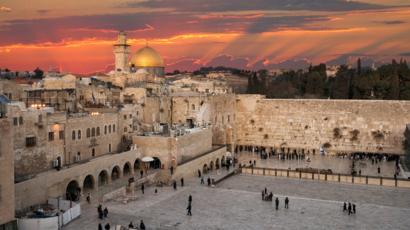
by catholicherald.co.uk — The proposed Israeli-Palestinian peace plan announced this week is “no solution,” Catholic bishops of the Holy Land said on Wednesday. “This plan will bring no solution but rather will create more tensions and probably more violence and bloodshed,” read a statement on Wednesday from the Assembly of Catholic Ordinaries of the Holy Land, which represents Christians from Latin, Melkite, Maronite, Syrian, Armenian, and Chaldean churches in communion with Rome. The ordinaries said that the plan was one-sided in favor of Israel’s traditional demands for a two-state solution and was a “unilateral initiative” that did not involve the agreement of the Palestinians, nor respected their “equal rights and dignity.” “It is to be considered a unilateral initiative, since it endorses almost all the demands of one side, the Israeli one, and its political agenda,” the statement read. “On the other hand, this plan does not really take into considerations the just demands of the Palestinian people for their homeland, their rights and dignified life.”
The proposed “Peace-to-Prosperity” plan, announced on Wednesday by U.S. President Donald Trump and Israeli Prime Minister Benjamin Netanyahu, outlined a path to statehood for Palestine as part of a “two-state solution.” Tuesday’s proposal is open to acceptance by Palestinian leaders for a four-year term. It would set up borders for a new Palestinian state with its capital of “al-Quds,” the Arabic name for Jerusalem, encompassing parts of East Jerusalem. However, the rest of the city—including the Old City—would remain part of Israel. Israel would also keep around a third of the West Bank, including existing settlements and the Jordan Valley. There would be a four-year halt to an expansion of Israeli settlements into the proposed Palestinian territory, but there is no freeze on settlements within Israel’s proposed future boundary in the West Bank. Appearing with President Trump on Tuesday at the White House, Netanyahu said that Israel would not wait to “apply its laws” to areas that would fall under its control in the proposed boundaries, including the Jordan Valley and Jewish communities in Judea and Samaria.
The Palestinian Authority president Mahmoud Abbas rejected the plan on Tuesday, saying it “will not pass.” The assembly has previously advocated for mutual equality and respect for Palestinians in peace talks. In a May, 2019, statement, the assembly noted the urgency of a peace agreement. “Many in Palestine and in Israel feel that since the launch of the peace process, their lives have become more and more unbearable,” its statement read. “Many have left, many more consider leaving and some are resorting to violence. Some die quietly and others are losing faith and hope.” On Wednesday, the bishops added that “we expect” that previous Israeli-Palestinian agreements to “be respected and improved upon.” The Vatican has previously advocated for a two-state solution with a status quo policy for shared religious sites.
Monsignor Fredrik Hansen, chargé d’affaires of the Permanent Observer Mission of the Holy See, told the UN Security Council on January 22 that “the appeal to maintain the status quo of the holy sites of Jerusalem, dear to Jews, Christians and Muslims in virtue of their religion and important for the cultural heritage of the whole human family, is one that has been repeatedly made.” The Vatican has also recognized the legitimacy of the State of Israel but with boundaries “recognized by the international community.” Both Israel and Palestine should come to an agreement “with the support of the international community and in compliance with United Nations resolutions,” the Holy See said in an October statement after the U.S. changed its position on Israeli West Bank settlements. The U.S. in November had reversed its position on Israeli settlements in the West Bank, saying now that they do not “per se” violate international law. Netanyahu supported Israeli sovereignty over the settlements, in his campaign for re-election in 2019.
Regarding the Holy Sites, the “status quo” agreement at the Temple Mount and Haram al-Sharif would be maintained under Tuesday’s peace plan, with Muslims being allowed to peacefully visit the al-Aqsa Mosque at the Temple Mount. There is also a proposed “West Bank-Gaza Tunnel” for high-speed rail connecting the two areas, as well as the designation of a third of the Gaza Strip as a “high-tech manufacturing industrial zone.” President Trump also pledged $50 billion towards the Palestinian state for job creation and anti-poverty efforts.



